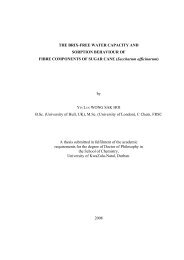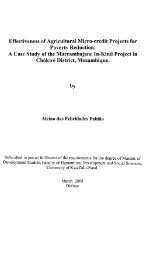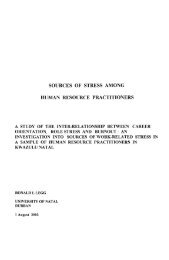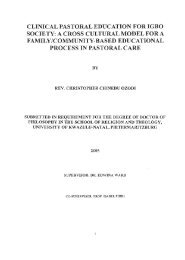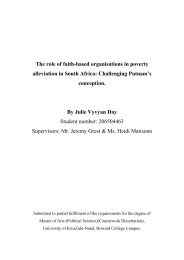View/Open - ResearchSpace - University of KwaZulu-Natal
View/Open - ResearchSpace - University of KwaZulu-Natal
View/Open - ResearchSpace - University of KwaZulu-Natal
Create successful ePaper yourself
Turn your PDF publications into a flip-book with our unique Google optimized e-Paper software.
4.3 Perceptions <strong>of</strong> infection control practices by HBCCs/project managers and<br />
volunteer caregivers<br />
Participants were asked about their understanding <strong>of</strong> infection control practices. Infection<br />
control practices were seen as important for prevention <strong>of</strong> cross infections either from the<br />
patients to the volunteer caregivers or from the volunteer caregivers to the patients. Infection<br />
control practices were also seen to be important because <strong>of</strong> the need for proper hygiene in the<br />
communities.<br />
4.3.1 Important for prevention <strong>of</strong> cross infections from the patient-to-volunteer caregivers<br />
Majority <strong>of</strong> the volunteer caregivers and home-based care coordinators mentioned that<br />
infection control practices were important because they felt that they were able to protect<br />
themselves from infections such as Tuberculosis (T.B); HIV and diarrhoea. For example, one<br />
home based care coordinator said:<br />
“Our opinion is to tell the volunteer caregivers to prevent or protect themselves because they<br />
are working with people whom they do not know. Even if they find an injured person they<br />
must not take chances <strong>of</strong> touching the blood because they may happen to get diseases. They<br />
must wear the gloves and protect themselves because it is very painful to find that a volunteer<br />
got infected on duty while he/she was helping a person in the community…”<br />
(HBCC, organisation D)<br />
Most participants in focus group discussions emphasised that they felt protected from T.B,<br />
HIV and diarrhoea:<br />
“It is highly important... that we are protected from T.B and HIV/AIDS because most <strong>of</strong> the<br />
patients have sores. It protects us from diarrhoea you know that one is also contagious<br />
sometimes if you are careless and if you live in unhygienic conditions. For instance if I have<br />
to touch that person I have to wash my hands first. Chances <strong>of</strong> being infected are high and<br />
with these gloves <strong>of</strong> ours ... and on T.B. especially it is important to protect yourself because<br />
you will get infected and come back to infect your children and other people so it is important<br />
it helps to protect ourselves.” (Focus group 7, organisation G)<br />
4.3.2 Important for prevention <strong>of</strong> cross infection from the volunteer caregivers-to-patients<br />
Some participants in focus group discussions stated that it was important to practice infection<br />
control to protect the patients from being infected by the caregiver’s infections:<br />
“We would say that it is very important, because I have my own diseases and they have their<br />
own. I should not infect my client with my disease. In the end we shouldn’t then end up<br />
infecting each other with these diseases”. (Focus group 10, organisation J)<br />
43




